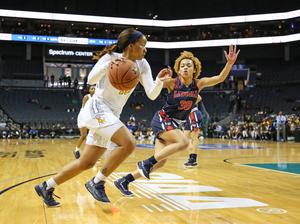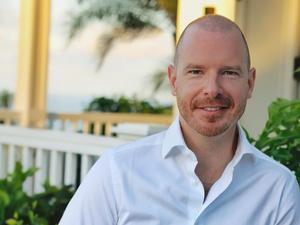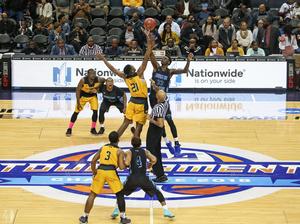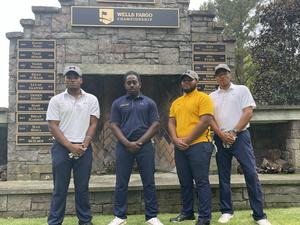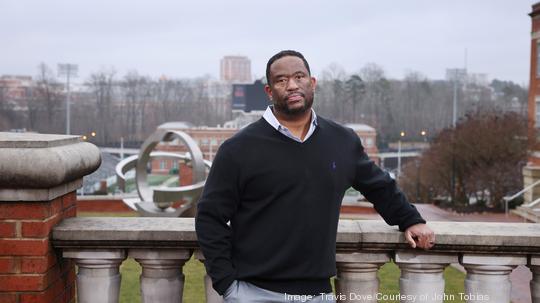
John Tobias is a rarity in the fast-growing field of sports data analytics: a Black man. Now, Tobias, 52, hopes to help bring more ethnic and gender diversity into his profession — and soon.
Tobias turned an internship in 2004 with the NBA Charlotte Bobcats (the franchise became the Hornets in 2014) into a job working on the team’s game-day statistics crew. That led to his current role as a full-time statistician at ESPN starting in 2013.
Along the way, Tobias took up teaching as an adjunct professor at UNC Charlotte. Now, he juggles his ESPN duties with being a full-time professor of sports statistics and analytics in UNCC’s School of Data Science.
Tobias mostly works on college sports broadcasts for ESPN, feeding data nuggets and statistics to announcers while sitting next to them at stadiums and arenas. He teaches on Mondays and Wednesdays, when he’s likeliest to be in Charlotte rather than traveling to or from a game.
As much as he loves his work at ESPN and UNCC, Tobias now has a bigger goal: making sports data analytics look a lot more like the country as a whole.
The national reckoning on race and opportunity spurred by the murder of George Floyd in 2020 has focused attention on inequities in numerous industries, including sports analytics. That conversation has made Tobias a de facto spokesman for minorities in the industry — as seen most recently in The Washington Post in an article detailing the dearth of diversity at the MIT Sloan Sports Analytics Conference, an industry gathering that serves as an invaluable networking opportunity for those who can afford to attend.
The industry conference represents a small part of a much larger problem: As much as inner-city and minority kids may see sports as a possible path to a better life, they’re only seeing the most obvious part: playing in the big leagues. Those jobs happen to be the scarcest — and have the shortest tenures. By contrast, data analytics and other white-collar sports jobs can provide a career-long occupation.
Tobias is moving to change those circumstances.
“If you’re going to identify a problem, make sure that you offer a solution,” he said during a recent interview. “This (problem) is something that’s been going on for many years now.”
In 2020, Tobias started a nonprofit called Strength In Numbers to promote the possibilities of sports data analytics to high school students. As a teenager, Tobias said, he loved sports but could never have imagined a career like the one he has today.
After college, he spent nearly a decade in what he described as unsatisfying jobs in corporate finance. Then, Tobias had what he calls a personal epiphany: unhappy with his career, he cataloged everything “I was passionate about. And one thing that stood out was sports.”
With that, he went to graduate school, where he earned a degree in sports management from High Point University.
Beginning next month, Tobias and Strength in Numbers hope to create similar epiphanies sooner. A pandemic-delayed plan is getting off the ground with Tobias scheduled to host four, four-day sports analytics summer camps for high-school students from underrepresented backgrounds: Black students, Latino students and other people of color, as well as female students.
Tobias noted that industry statistics show less than 10% of people in sports data analytics are people of color or women.
The first session will be at UNCC’s uptown campus, followed by stops at USC in Los Angeles, Columbia University in New York and the University of Minnesota in Minneapolis. Campers will attend at no cost and receive breakfast and lunch; they’ll hear from Tobias and others in sports who deal with numbers in various ways, including on-field statistics and player comparisons, salary cap data, esports and betting.
Having camps on campus is intentional.
“I could have it at a convention center,” Tobias said. “But, you know, a lot of times when you have high-school students, some of them have never been on a college campus before. I think that a lot of times it can really inspire them. To say, ‘This really feels good, and I can actually see myself being in this situation.’”
Sports technology is a multibillion-dollar industry and rapid growth is anticipated over the next five years.
For his camps, Tobias has personally recruited students. Locally, he visited schools and spoke to groups of students.
“I spoke to them in their lunch cafeteria: ‘Hey, listen, do you like sports? You like math? Why don’t you go ahead and come to this camp?’”
Tobias has some sponsors and donors aboard to help defray costs but is seeking additional contributors. He’s also eyeing expansion, hoping to do eight camps each summer as soon as possible.
Sports teams and others in the industry have inquired about bringing Tobias’ camp to their cities.
He acknowledged the constant demands of balancing two full-time jobs and a nonprofit but, if things go as planned, it will be worth it, Tobias believes.
“If you think that it’s something that’s bigger than you, that you can play a small role in helping solve this situation? I’m willing to do it.”
